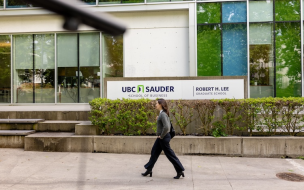While the reputation of one's alma mater is certainly a factor in the job market, there are plenty of other aspects to consider when pursuing an MBA.
Here are four schools that may not be on your radar, but should be on account of what they offer.
1. Wisconsin School of Business — University of Wisconsin-Madison
One of the chief distinguishing features of Wisconsin School of Business is its disproportionately high return on investment. That boils down to a number of different aspects, according to assistant dean Blair Sanford who cites a whopping 7.4-to-1 salary-and-bonus-to-debt ratio upon graduation.
Another draw for UW is the staggeringly low...
Of course, the school's pedagogical integrity is what really makes its value so high. “The Wisconsin MBA prepares students for the challenges of global business through our specialized model that emphasizes a strong core curriculum and deep expertise in key fields of business with active, hands-on learning experiences,” states Blair, adding that the school also boasts “98-to-100% internship placement, nearly 90% job placement, strong salaries, and the second lowest priced program out of the top-40 ranked business schools.”
2. Marriott School of Business — Brigham Young University
BYU Marriott is known as one of the most cost-effective programs worldwide and has long been recognized as the US' most family-friendly school, according to the Princeton Review.
Grant McQueen, the school's MBA program director says: “Our students go further, faster—they graduate having had intensive experience in unstructured, collaborative problem solving that goes far beyond what’s offered at other business schools. The best companies in the world recognize and appreciate this, leading to a placement rate that is consistently above 90% each year.”
One such opportunity for collaboration and learning is Cougar Capital, an in-house venture capital and private equity fund run by second year MBAs. It offers students hands-on learning through mentorship with partnered firms in the industry, helping them to learn about portfolio management, due diligence, and sourcing deals.
3. Presidio Graduate School
At a mere 15 years old, Presidio (with campuses in San Francisco and Seattle) is one of the youngest schools in the US. While some might be wary of an upstart b-school, it's important to note that its youth gives it a fresh and relevant outlook and, in fact, it's the longest-running sustainable American MBA program.
"The world is facing dozens of social, economic, and environmental crises—each of which could result in ‘game over’ for us humans,” notes Marsha Willard, part of the program's core faculty.
“Business is now the most powerful force on the planet and can no longer stand idly by—or worse, further exacerbate these problems. Most business schools have finally come to recognize the situation but still only nibble around the edges by teaching students how they can help business be 'less bad'.”
According to Marsha, Presidio's contrasting approach aims to “provide students with the concepts, tools, and experiences that will take business and government policy beyond damage control to building vital, profitable, and contributing enterprises."
4. Rady School of Management — University of California, San Diego
Rady is another newer program—one with a strong and unique experiential orientation. “What distinguishes the Rady School of Management is that entrepreneurial thinking is woven into every aspect of the MBA program,” says Lada Rasochova, executive director at Rady's California Institute for Innovation and Development. “This intense focus on entrepreneurship has led to 150 operational startups being founded by Rady School students and alumni since the first MBA class graduated in 2006.”
Its Lab To Market component aims to prepare students for the real world by emulating it. Students move from the classroom to a project-driven scenario, learning to apply the frameworks they acquire to evaluate the viability of opportunities and business models, and bring their own ideas into fruition. The aforementioned CIID also works to bolster academics with real-world insights through integrating students into a number of business acceleration initiatives.
Register for free to continue reading
RECAPTHA :
b4
78
f9
2b















The best of our Premium Articles